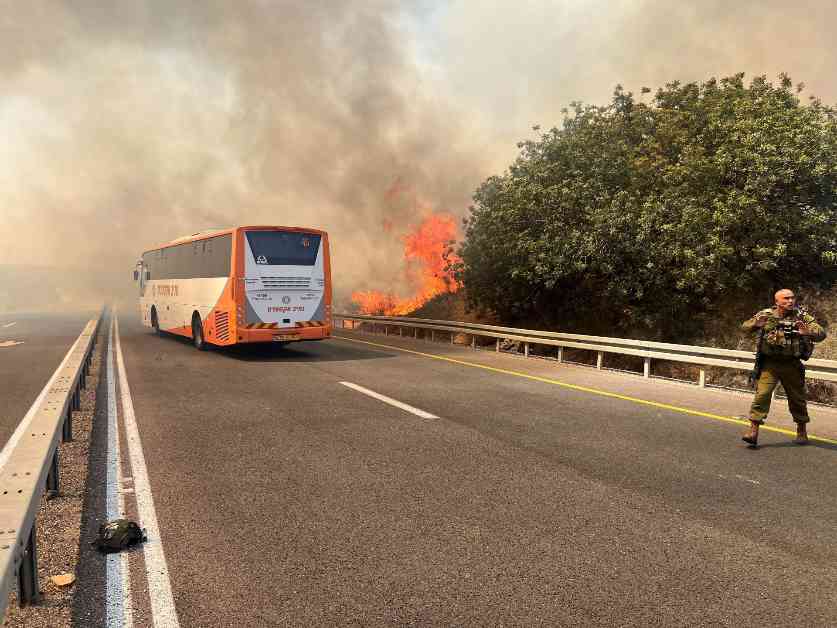Hezbollah Warns of Potential Losses as Israel Expands Conflict in Lebanon
Amid escalating tensions between Israel and Lebanon, Hezbollah’s deputy leader, Naim Qassem, issued a warning to Israel about the potential consequences of a full-scale war on Lebanon. This warning comes as Israeli politicians, led by Prime Minister Benjamin Netanyahu, are pushing for action against Hezbollah following ongoing tit-for-tat attacks along the Israel-Lebanon border.
Hezbollah’s Concerns and Response
In response to the looming threat of a broader conflict, Hezbollah’s Naim Qassem cautioned Israel about the significant losses that both sides would incur if a full-scale war were to erupt. He emphasized that such a conflict would result in the displacement of hundreds of thousands more Israelis in the country’s north, adding to the already dire humanitarian situation in the region.
Qassem reiterated Hezbollah’s stance on the current situation, stating that the group’s attacks on Israel are in solidarity with Palestinians in Gaza and would cease once the conflict in Gaza comes to an end. He also emphasized that Hezbollah has no intention of instigating a war but is prepared to defend itself if Israel chooses to escalate the situation.
Israel’s Response and Plans
On the Israeli side, Prime Minister Benjamin Netanyahu is reportedly considering launching a “broad and strong operation” on the northern border with Lebanon, as reported by Israel’s Channel 13. This potential escalation comes in the aftermath of Israel’s deadly war on Gaza, which has fueled tensions across the region.
Israeli Defense Minister Yoav Gallant has indicated that Israeli forces are close to completing their mission in Gaza and will shift their focus to the northern border with Lebanon. Gallant emphasized the need to address the security challenges posed by Hezbollah and to ensure the safe return of Israeli citizens to their homes in the north.
Opposition politicians in Israel, including Benny Gantz, have criticized the government for its handling of the situation and called for decisive action against Hezbollah. Gantz urged the government to exercise power and authority to protect residents in Israel’s north and restore stability to the region.
Escalating Attacks and Consequences
The ongoing hostilities between Hezbollah and Israel have resulted in casualties on both sides, with dozens of people killed and tens of thousands displaced along the border. Israel’s attacks on Lebanon have claimed the lives of hundreds, including civilians, while Hezbollah’s assaults have targeted Israeli military positions and caused casualties among soldiers and civilians.
Recent airstrikes by the Israeli military targeted suspected Hezbollah weapons storage facilities in Lebanon’s Bekaa Valley, causing injuries to several people, including children. In retaliation, Hezbollah claimed responsibility for attacks on Israeli military targets, underscoring the cycle of violence that has gripped the region.
The Impact on Civilians and the Humanitarian Crisis
The escalating conflict between Hezbollah and Israel has taken a toll on civilians, displacing thousands and causing widespread destruction in border areas. The Lebanese Ministry of Health has reported injuries and damage resulting from Israeli airstrikes, highlighting the humanitarian consequences of the violence.
Both sides have expressed concern for the well-being of civilians caught in the crossfire, with calls for measures to protect vulnerable populations and prevent further escalation of the conflict. However, the complex dynamics of the situation make it challenging to find a peaceful resolution and end the cycle of violence.
The Role of International Actors and Diplomatic Efforts
As tensions mount between Hezbollah and Israel, the role of international actors and diplomatic efforts becomes crucial in de-escalating the conflict and preventing further loss of life. Regional powers, including the United States and European Union, have called for restraint and dialogue to address the root causes of the conflict.
Efforts to engage both parties in constructive dialogue and negotiation are essential to finding a lasting solution to the longstanding tensions between Hezbollah and Israel. The international community’s support for peacebuilding initiatives and humanitarian aid can help alleviate the suffering of civilians affected by the conflict.
Conclusion
The escalating conflict between Hezbollah and Israel poses a significant threat to regional stability and the well-being of civilians in the affected areas. Both sides must exercise restraint and prioritize dialogue to prevent further escalation and address the root causes of the conflict. International support and diplomatic efforts are crucial in finding a peaceful resolution and ending the cycle of violence that has plagued the region for far too long.



























